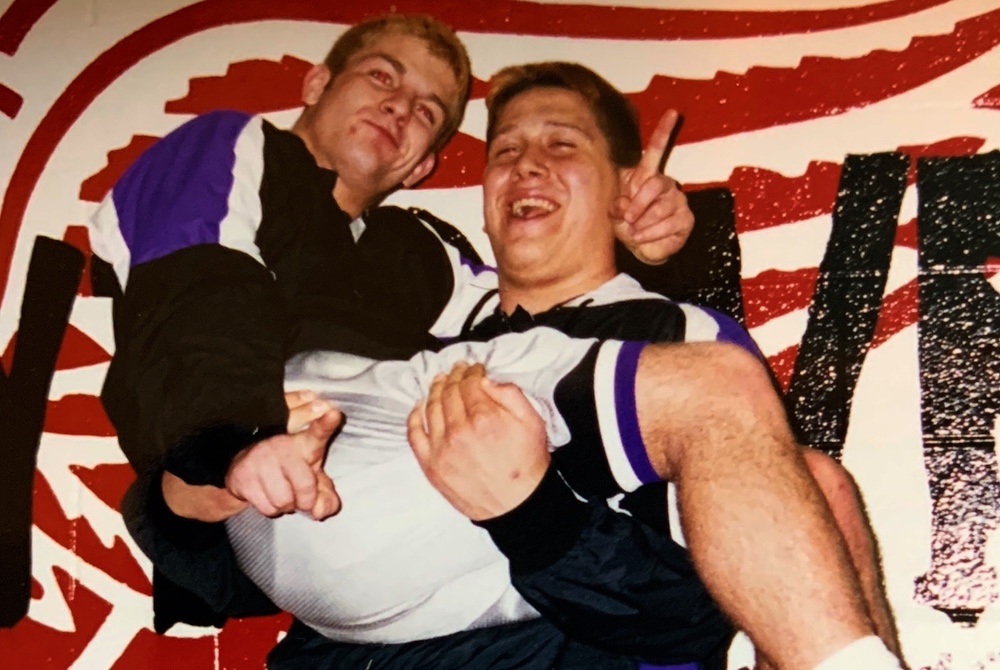
Caro Champs Find Common Ground Again as Mental Health Providers
By
Paul Costanzo
Special for MHSAA.com
July 8, 2021
Phil Millerov and Phil Niklowicz wanted to do more than simply defeat opponents when wrestling at Caro High School.
They wanted to dominate – physically and mentally.
 “We had this thing between us where we wanted to be done, and (opponents) didn’t want to come back on the mat with us,” Millerov said.
“We had this thing between us where we wanted to be done, and (opponents) didn’t want to come back on the mat with us,” Millerov said.
Twenty years later, both spend their days building people up. Millerov is a licensed professional counselor, while Niklowicz is a licensed therapist.
“I went out there looking to dominate and make sure it was known that I am the superior wrestler in all facets,” Niklowicz said. “I would try to run up as many points as fast as I can. I would teach the same thing when coaching, specifically with my nephew. You’re saying, ‘Listen, we want to break these people.’ Then the next day, in a therapy session, it’s like, ‘Let’s build up your self-esteem and set some goals to boost ourselves up.’”
The close friends and two faces of Caro’s surging wrestling program in the late 1990s now have very similar careers. Millerov – who finished second, third and first at 275 pounds in the 1998, 1999 and 2000 MHSAA Finals, respectively -- works in private practice at Transitions Counseling Service in Greenville, where he specializes in substance abuse disorders. He also has served as a Class 1 Fellow at the WK Kellogg Foundation.
Niklowicz – a two-time MHSAA Finals champion (1999 and 2000) and four-time placer – is working in private practice in Southfield, seeing mostly children. He also works in adult foster care with patients who have had traumatic brain injuries.
“He and I went and hiked Pictured Rocks at the beginning of May,” Millerov said. “And we joked about how nobody would have guessed that we’d be doing this now.”
That Millerov and Niklowicz are still close does not come as a surprise. Their friendship began when their wrestling careers did, as 6-year-olds in the Caro Growlers program. As they were becoming two of the state’s top wrestlers, they would share rides to tournaments, and their families grew close.
In high school, despite their size difference – Niklowicz wrestled at 135 his senior year – it wasn’t uncommon to see them warming up together.
“We were definitely easy going and liked to mess around a lot,” Niklowicz said. “We used to mess around before meets and throw each other. He would jump and I would throw him. People would look at us like, ‘Why is that little guy throwing that big guy?’”
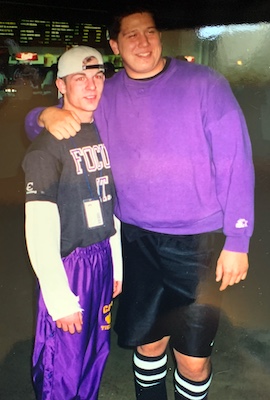 While their teams never made it out of the Regional, Millerov and Niklowicz helped set the stage for a program that would become among the best in Division 3 throughout the 2000s, qualifying for five straight Quarterfinals from 2003-07 and winning the Division 3 Finals title in 2003.
While their teams never made it out of the Regional, Millerov and Niklowicz helped set the stage for a program that would become among the best in Division 3 throughout the 2000s, qualifying for five straight Quarterfinals from 2003-07 and winning the Division 3 Finals title in 2003.
Individually, they were among the most well-known and feared wrestlers in the state.
“Niklowicz and I were fortunate to have each other, because we pushed each other,” Millerov said. “We were in constant competition with each other and ourselves. Just to kind of push each other, it was a great thing.”
Niklowicz finished fifth as a freshman and third as a sophomore before winning back-to-back titles to close out his career. In 1999, he defeated Nick Oertel of Goodrich 9-2 in the 125-pound final, and the next year he defeated Oertel’s teammate, Ryan Tripp, 7-5 at 135. Tripp would go on to win an individual title the following year. Niklowicz would finish his career with 214 victories.
“I think probably both (Finals titles) were equal,” Niklowicz said. “I think there was probably a little more stress going into my senior year. My motivation always came from improving, then it was maintaining the state title. You don’t want to go the opposite direction.”
Millerov lost a tight 6-4 decision against Remus Chippewa Hills’ Bob Kozlowski in the MHSAA Finals as a sophomore, and had an epic 12-10 match against future NFL defensive lineman Jason Babin of Paw Paw in the 1999 semifinals before fighting back to take third. The next year, he won his title via first-period pin against Dan Kliphuis, a two-time runner-up from Grand Rapids West Catholic. Millerov finished with 196 career wins and set the state record for pins in a career (160), which was broken the next season by Nick Simmons of Williamston and is now held by Justin Zeerip of Hesperia. The 56 pins Millerov recorded his senior season remains second all-time to Simmons, who had two seasons with 57.
“I never really thought about (the pin record) to be quite honest,” Millerov said. “It was just kind of in the background. It didn’t matter; all I cared about was winning this match, and I wanted to do it in the most effective, efficient way I could.”
They both continued their wrestling careers, but went their separate ways in college, with Millerov heading to Neosho County Community College in Kansas and Niklowicz to Virginia Tech.
Millerov had interest from several Division I schools coming out of high school, including some in the Big Ten, but he admits his grades weren’t good enough at the time. Neosho provided a chance to compete with some of the best in the country while at the junior college level, however, as the team took second at the National Junior College Athletic Association championships in 2002.
He transferred to Central Michigan after his sophomore year, joining his girlfriend – now his wife – who was already attending, and walking onto the wrestling team. While his relationship lasted, wrestling did not.
“I was distracted,” Millerov said. “My grandmother passed away in 2002 in that summer. I was trying to get that motivation back, and I just lost it. There has to be that edge with wrestling. When things didn’t work out, I struggled. Wrestling was my identity.”
Millerov was working to follow in his father’s footsteps and become a police officer. But the elder Phil Millerov, who died in 2012, talked his son out of it.
“Looking back on it, for me, it was obviously the right decision,” Millerov said.
The idea to go into counseling came after Millerov was married in 2006, as his wife had gotten into the program. He went back to school to earn his bachelor’s degree from CMU in 2007, and would go on to get his master’s from CMU, as well.
“I had taken a bunch of psychology courses just because I liked the field,” Millerov said. “I liked to be challenged. I liked puzzles, and with psychology, it’s like a new puzzle every hour. It just clicked. I flew through and graduated with like a 3.8. I was like, ‘Wow, I kind of feel smart.’ It was good to find something I was passionate about again.”
Millerov said he’s constantly learning and honing his craft, much like he did as a wrestler. A major difference now, however, is that he’s found more balance in his life.
“I think about working with athletes in addiction, I find a lot of similarities,” he said. “Wrestling was my life, it’s how I identified myself. I hear that same kind of talk around people struggling with addiction. One you’re considered successful for, the other you’re not. Most of my growth has been around finding balance. I find that my happiness and my clients’ as well, is when we found that balance instead of being good at just one thing. I want you to have passion, I want you to do things you love, but I also want you to be effective as a husband, a father, whatever other responsibilities you have.”
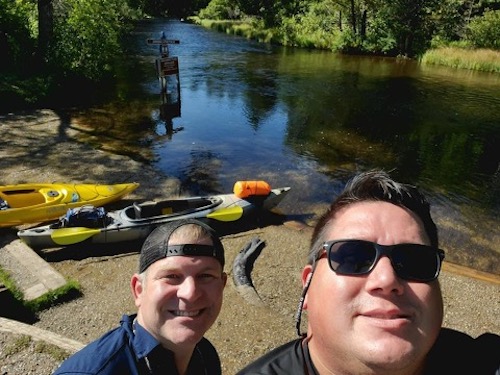 Niklowicz’s journey to becoming a therapist was more telegraphed, as both of his parents work in mental health, and he said it was always something he wanted to do, as well.
Niklowicz’s journey to becoming a therapist was more telegraphed, as both of his parents work in mental health, and he said it was always something he wanted to do, as well.
He attended Virginia Tech on a wrestling scholarship, but transferred to Eastern Michigan after one year. The Hokies had recruited him to wrestle at 133 pounds, but when the team’s 125-pounder was injured, Niklowicz was asked to cut down further. Like Millerov, he struggled when his wrestling career ended.
“I just had a really bad taste in my mouth after leaving Virginia Tech and trying to cut all this weight,” he said. “Some of it was I had lost the desire to work out, to wrestle. Fifteen years, roughly, of my life was dedicated to wrestling, and once you stop, what do I do with my winters? What do I do with seven months of the year? It was definitely a part of my identity; that’s why I got into coaching. I did MMA fighting for a little bit to have something competitive.”
Like Millerov, Niklowicz said finding balance was important.
“In the mental health field, specifically, there’s a lot of burnout for people,” he said. “Every day, you’re listening to people talking about their problems, but at the same time, they’re coming for a reason and they’re there for help, so you have to provide that help and have to motivate yourself to come to the office every day and give it your best. I try to instill the motivation that I used to other people.”
When Niklowicz looks at his time as an athlete compared to his work as a therapist, he said that work ethic is the main characteristic that has carried over.
“I think my practice mentality was the same as it was on the mat,” he said. “Even in the wrestling room, these are people I’m friends with, people I grew up with, and I still didn’t want anyone to score on me. Then you just look at your work ethic outside of wrestling, whether you’re studying for exams or motivating yourself to get up and go to class.”
While they are no longer living in the same town or living similar lives – Millerov is married with three kids, while Niklowicz is single – the connection between Caro’s dominant duo remains strong, both professionally and personally.
“I don’t think we ever thought we would be going down such a similar path, and I doubt that either one of us grew up thinking we would do the exact same thing,” Niklowicz said. “We met when we were 6 years old, and we’ve been best friends forever. I think it’s hilarious that we’ve taken such similar paths but with some glaring differences. It’s definitely interesting that we’re still really good friends after 30-some years, especially since we’ve moved on and gone our separate ways.”
2020-21 Made in Michigan
June 28: Michigan's Minor Leaguers Making Up for Lost Season - Read
PHOTOS: (Top) Caro’s Phil Millerov lifts teammate Phil Niklowicz as both celebrate Division 3 championships during the 2000 Individual Finals at Joe Louis Arena. (Middle) Niklowicz, left, and Millerov were high school warm-up partners despite wrestling at significantly different weights. (Below) Niklowicz and Millerov take a selfie during a hiking trip to Pictured Rocks National Lakeshore in May. (Photos courtesy of Niklowicz and Millerov.)
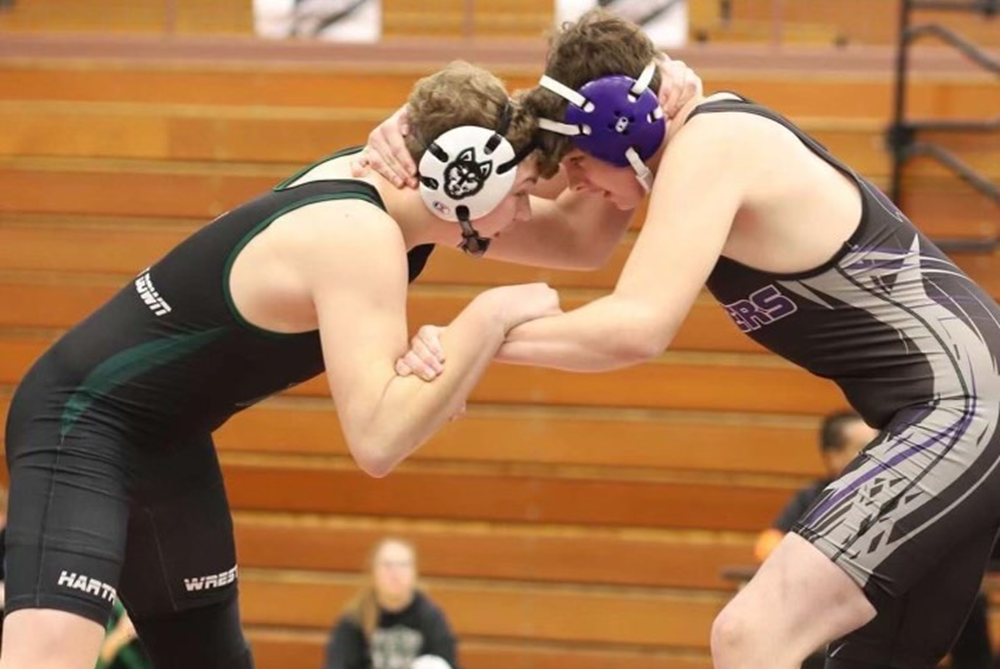
Inspired by Dad's Memory, Lawrence's Vasquez Emerges After Family Losses
By
Pam Shebest
Special for MHSAA.com
January 16, 2024
LAWRENCE — While COVID-19 affected many students in different ways, it definitely made an impact on Austin Vasquez.
 As a freshman at Lawrence High School during the pandemic, Vasquez lost his grandmother Theresa Phillips to cancer on March 25, 2021.
As a freshman at Lawrence High School during the pandemic, Vasquez lost his grandmother Theresa Phillips to cancer on March 25, 2021.
Two days later, on March 27, his father Tom Vasquez, died of complications from COVID. And on April 19 that spring, his grandfather Darrell “Gene” Phillips also lost his fight against the coronavirus.
“There is no way (to cope). You just have to keep on moving,” Austin said. “It’s what (my dad) would want me to do.
“He was my biggest (influence) in sports. He talked to me about never giving up – leave everything you’ve got.”
That is just what Vasquez is doing in the midst of his three-sport senior year.
He is the top wrestler at the school, competing at 175 pounds with a goal of making the MHSAA Tournament. He was a versatile contributor on the football field this past fall, and he’s planning to join the baseball team this spring.
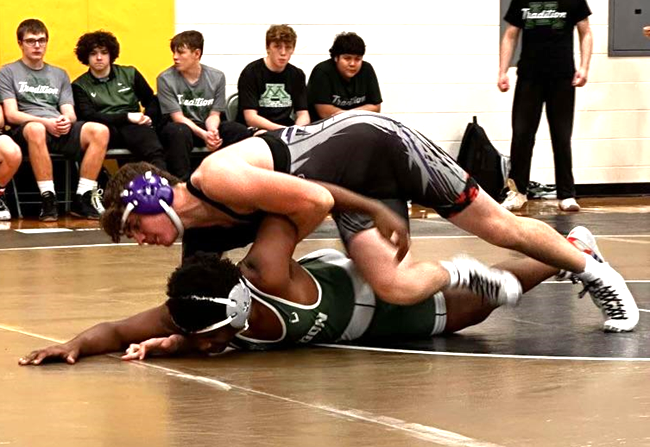 He’s 8-3 with six pins on the mat this winter after a busy summer of camps and tournaments. Those experiences helped lessen the nerves he’d felt during matches previously, and now he’s wrestling with an outlook of “everything to gain and nothing to lose.”
He’s 8-3 with six pins on the mat this winter after a busy summer of camps and tournaments. Those experiences helped lessen the nerves he’d felt during matches previously, and now he’s wrestling with an outlook of “everything to gain and nothing to lose.”
And Vasquez said he feels his dad’s presence as he prepares for competition.
“Before every match, before every game, I just think about what my dad would be telling me,” he said. “Everything he’s always told me has taught me to get better.
“In life, I still remember everything he taught me. He was definitely a great man, and I want to be like him someday.”
Wrestling also has made Vasquez more in tune with his health.
His sophomore season he went from 230 pounds to 215, and by his junior year was down to his current 175.
“I just wanted to be healthier, not just for wrestling,” he said. “I started going to the gym every night, watched my calories, and from there grew (taller).
“Now I’m at 6-(foot-)2, and I don’t know how that happened,” he laughed.
Lawrence coach Henry Payne said Vasquez always has a positive attitude and helps the other wrestlers in the program.
“When he notices a kid next to him doing a move wrong, he’ll go over and show him the right way,” Payne said. “We have a lot of young kids that this is their first year, and he’s been a good coach’s helper.”
The coach’s helper gig will continue after graduation.
"Next year we’re hoping to open up a youth program here, and I got him and an alumni that graduated last year and is helping the varsity team this year (Conner Tangeman) to take over the youth program for us,” Payne said.
 On the football team, Vasquez was a jack of all trades.
On the football team, Vasquez was a jack of all trades.
“He started at guard, went to tight end, went to our wingback, went to our running back. He was trying to get the quarterback spot,” football coach Derek Gribler laughed.
Vasquez said there is no other feeling like being on the field, especially during home games.
“Wrestling is my main sport, but I’d do anything to go back and play football again,” he said. “I just love it.”
Although the football team struggled through a 1-8 season, “It was still a really fun season,” Vasquez said. “Everybody was super close. Most of us never really talked before, but we instantly became like a family.”
Vasquez had the support of his mother, Heather, and four older sisters: Makaylah, Briahna, Ahlexis and Maryah. He also found his school family helped him get through the end of his freshman year.
“(My friends) were always there for me when everything was going on,” he said. “I took that last month off school because it was too hard to be around people at that time.
"Every single one of them reached out and said, ‘Hey, I know you’re going through a rough time.’ It really helped to hear that and get out of the house.”
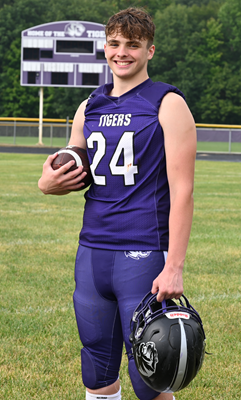 The family connection between Vasquez and Lawrence athletic director John Guillean goes back to the senior’s youth.
The family connection between Vasquez and Lawrence athletic director John Guillean goes back to the senior’s youth.
“I was girls basketball coach, so I coached his sisters,” Guillean said. “I remember him when he was pretty young. I knew the family pretty well. I knew his dad. He was pretty supportive and was there for everything.”
Vasquez said that freshman year experience has made him appreciate every day, and he gives the following advice: “Every time you’re wrestling, it could be your last time on the mat or last time on the field. Treat every game and every match as if it’s going to be your last. If you’re committed to the sport, take every chance you have to help your team be successful.”
Gribler has known Vasquez since he was in seventh grade and, as also the school’s varsity baseball coach, will work with Vasquez one more time with the senior planning to add baseball as his spring sport.
“When we talk about Tiger Pride, Austin’s a kid that you can put his face right on the logo. His work ethic is just unbelievable,” Gribler said. “Everything he does is with a smile. He could be having the worst day of his life, and he’d still have a smile on his face. He pushes through. It’s tough to do and amazing to see.”
The coach – who also starred at Lawrence as an athlete – noted the small community’s ability to rally around Vasquez and his family. Lawrence has about 150 students in the high school.
“It goes beyond sports,” Gribler said. “Austin knows when he needs something he can always reach out and we’ll have his back, we’ll have his family’s back. It’s not so much about winning as it is about the kids.”
Vasquez is already looking ahead to life after high school. He attends morning courses at Van Buren Tech, studying welding, and returns to the high school for afternoon classes.
“I’d like to either work on the pipeline as a pipeline welder or be a lineman,” he said, adding, “possibly college. I would like to wrestle in college, but let’s see how this year goes.
“I’m ready to get out, but it’s going to be hard to leave this all behind.”
 Pam Shebest served as a sportswriter at the Kalamazoo Gazette from 1985-2009 after 11 years part-time with the Gazette while teaching French and English at White Pigeon High School. She can be reached at [email protected] with story ideas for Calhoun, Kalamazoo and Van Buren counties.
Pam Shebest served as a sportswriter at the Kalamazoo Gazette from 1985-2009 after 11 years part-time with the Gazette while teaching French and English at White Pigeon High School. She can be reached at [email protected] with story ideas for Calhoun, Kalamazoo and Van Buren counties.
PHOTOS (Top) Lawrence senior Andrew Vasquez, right, wrestles against Hartford this season. (2) Vasquez works on gaining the advantage in a match against Mendon. (3) From left: Lawrence wrestling coach Henry Payne, athletic director John Guillean and football and baseball coach Derek Gribler. (4) Vasquez also was a standout on the football field. (Wrestling and football photos courtesy of the Lawrence athletic department. Headshots by Pam Shebest.)

